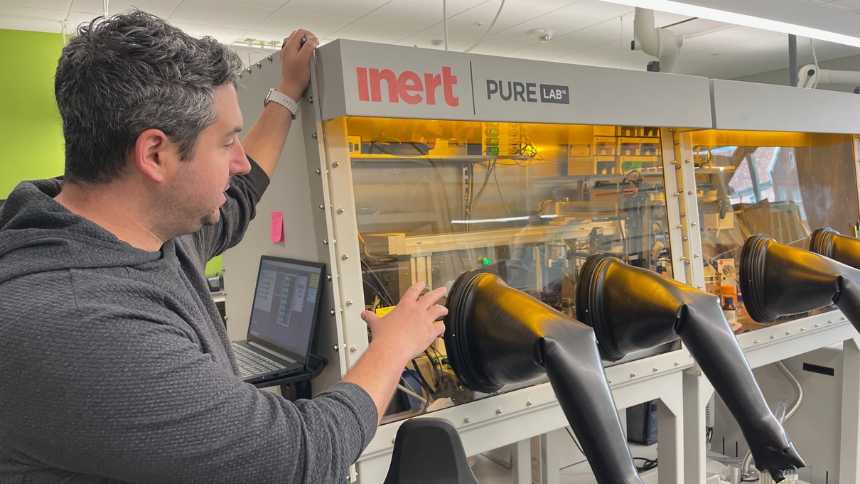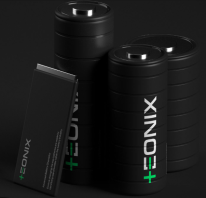
Eonix making great progress six years after relocating to Knoxville
The start-up was in the second cohort of the "Innovation Crossroads" program at Oak Ridge National Laboratory.
Don DeRosa, Co-Founder and Chief Executive Officer of Eonix, is not from around here, but the transplant from New York has established roots in the community, and one can imagine that it would take a lot for him to relocate the tech start-up.
“It’s a great place to live and do business,” he says.
We first met the engaging New Yorker when he brought the company to Knoxville to participate in the second cohort of the “Innovation Crossroads” program operated by Oak Ridge National Laboratory. The year was 2018, some four years after Eonix had spun out of the College of Nanoscale Science and Engineering at the State University of New York at Albany and experienced one of those entrepreneurial pivots when, after years of development and substantial funding, the company learned that it had a unscalable innovation.
 Fast forward six years, and DeRosa says the start-up is positioned in a much better place. Eonix has a robust relationship with Schrödinger Inc. to accelerate the discovery and design of materials for safer, energy-dense lithium-ion batteries. The company has its first product under review by the U.S. Department of Defense. It has a just under 1,000-square-foot lab in the new Zeenah Engineering Complex at the University of Tennessee, Knoxville (UTK). Finally, Eonix plans to have a pilot line in place by the end of 2024, and there’s a capital raise in the offing.
Fast forward six years, and DeRosa says the start-up is positioned in a much better place. Eonix has a robust relationship with Schrödinger Inc. to accelerate the discovery and design of materials for safer, energy-dense lithium-ion batteries. The company has its first product under review by the U.S. Department of Defense. It has a just under 1,000-square-foot lab in the new Zeenah Engineering Complex at the University of Tennessee, Knoxville (UTK). Finally, Eonix plans to have a pilot line in place by the end of 2024, and there’s a capital raise in the offing.
“It would be a Palo Alto pre-seed round if we were in California, but it is a Series A in Knoxville,” DeRosa says.
That’s significant progress for a company that had spent $500,000 before pivoting as part of its time at “Innovation Crossroads” to focus on materials for new batteries, specifically designing new electrolytes that are drop-in compatible with anodes, cathodes, and form factors manufactured today.
About the progress the company has made, DeRosa says in his matter-of-fact way, “Two years ago, we claimed what we were going to do. Now, we are executing on that plan.”
A key component is what he describes as a “purpose-built robot for electrolyte development that allows us to generate incredibly complex electrolytes.” How many? Thirty-two solutions every three hours.
The automated lab allows Eonix to go from idea to commercial prototype at a facility under 1,000 square feet with minimal staff intervention. That in itself is significant, but DeRosa says that is just one of the benefits. “It means our scientists spend more time doing real science,” adding that the company’s database of compounds that feeds the robot exceeds 10 million.
Eonix is combining physics, the massive database of compounds, and machine learning, specifically an algorithm, to predict what to look at in terms of new materials for batteries that can be used anywhere from the subzero temperatures in the Artic or outer space to everything in-between. That includes low cost batteries for automobiles and electronics.
Noting the safety concerns related to lithium ion batteries and the tendency of some to catch on fire, DeRosa says that the company’s ATLAS sensor allows Eonix to see in real-time what is happening in the battery. That capability allowed the development of a nonflammable lithium ion battery commercial prototype in a mere four months.
The company’s relationship with UTK continues to grow. Eonix has five employees beyond DeRosa, and all of the recent hires are graduates of the university.
“What we are doing is so exciting from a science and entrepreneurial perspective,” he says. “We can have our cake and eat it, too.”
Explaining that Eonix does not intend to stop materials development, DeRosa said the company is focused on what he termed a “race to the bottom” – not in terms of the quality of the electrolytes it develops but on the cost of the development “for a fraction of the (current) cost.”
He also credited Launch Tennessee’s matching program for Small Business Innovation Research and Small Business Technology Transfer grants for helping along its journey.
“It’s a debt to be repaid,” DeRosa says in reference to not only Launch Tennessee but the community that has embraced him the last six years.
Like what you've read?
Forward to a friend!

